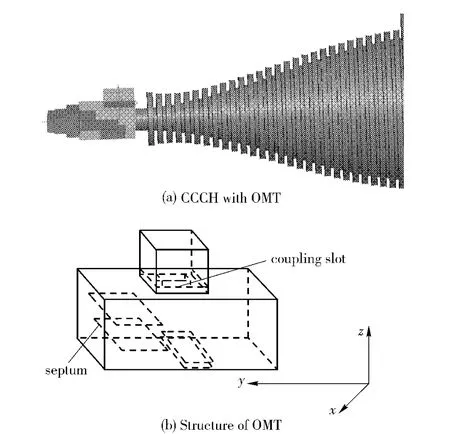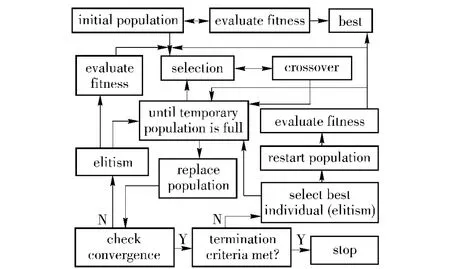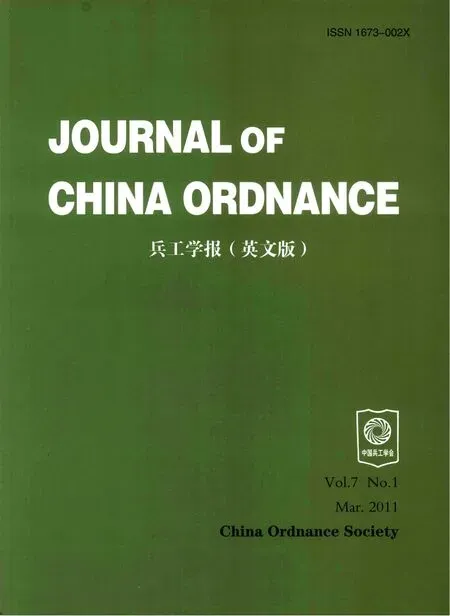Deployable Antenna with Compact Ortho-mode Transducer and Feeding Systems
WANG Hong-jian(王宏建),LIU He-guang(刘和光),ZHANG De-hai(张德海),YI Min(易敏),LIU Guang(刘广),CHEN Xue(陈雪)
(National Microwave Remote Sensing Laboratory,Chinese Academy of Sciences,Beijing 100190,China)
Introduction
The payload's weight and dimension are very important factors in satellite,especially for the launching stage.To reduce the weight and dimension,the deployable structure of antenna is employed.Under the deployable structure,the reflector of antenna is closed up during the launching stage while it stretches out to its working status when the satellite is in orbit.In this way,the dimension can be reduced greatly.As for the weight reduction of the antenna concerned,much attention should be focused on the feeding systems(such as the feeding structures and horns).
It is known that OMT[1-3]plays a key part in the realization of dual polarization antennas.Usually,it is set behind a circular horn and its dual linear polarizing output excites a circular waveguide,whereas its two inputs are provided by the feeding rectangular waveguides.Considering the applications in microwave remote sensing,a new compact dual-septum structure OMT has been build up to reduce the length and weight of the feeding structure.In this structure,the compact conical corrugated horn(CCCH)is employed to obtain almost the same orientation patterns in two main planes with the benefit of smaller dimension compared with the regular horn.
Genetic algorithm(GA)[4-5]is a kind of search techniques that mimics the mechanism of natural selection.Unlike other optimization methods,GA does not rely on the gradient information in the initial searching of guess space.It can obtain the best solution in whole space with the advantages of fast,robustness and easiness.Therefore,the FDTD in combination with micro-GA[6-8]is used to optimize the VSWR of new OMT.The optimized parameters are the dimensions of FDTD cells.
In addition,as a practical example,a very compact OMT and CCCH for dual-polarization deployable antenna is put forward and its design or analysis method is described in detail.The results show that it can be utilized for calibrating the radiometer system of Haiyang-2 satellite deployable antenna.
1 Design and Simulation
1.1 OMT Design
The principle of operation of the common OMT is explained as follows.A square common port is excited by either a horizontal or a vertical polarization wave.For the horizontal polarization excitation,yz-plane is the ideal perfect magnetic wall(PMW)and xz-plane is the perfect electric wall(PEW).For the vertical polarization excitation,according to the electromagnetic symmetry,the considered modes have PEW at the yzplane and PMW at the xz-plane.
When a vertical one is exciting the common port,it comes across a septum perpendicular to the electric field.But the septum should not affect significantly the propagation to axial port.In principle,some signal could go to lateral port.This effect can be avoided by consideration of two factors.First,the mode at lateral port generated by vertical excitation is evanescent,so the cut-off frequency of the waveguide,which is formed by lateral slot,is higher than that of the vertical polarizing wave.That is to say,the vertical polarization wave has an additional reactive load that has to be matched.Second,the match can be controlled by adjusting the slot's width and height.
The horizontal polarization should not be affected much by the slots.A compromise between both polarizations must be found.When the horizontal polarization from common port is arriving to the septum region,it is split along the septum into three fields.With a proper design of the septum profile,the signals at the lateral waveguide can also carry the power of the exciting wave.
The new double-septum OMT structure is shown in Fig.1.The presented configuration introduces double septa in the main waveguide(conventional structure has only one septum).The OMT in Fig.1 is composed of the following elements:an axial branch,a lateral component and a three-port junction.The square axial port is placed at the end of the axial branch,after a stepped transformer in the y-direction.
This proposed OMT has two advantages:1)preventing the waves from coupling between horizontal modes at the common ports since the reduced OMT size;2)facilitating the match of horizontal polarization between the lateral and common ports.The design parameters needed for this OMT are the thickness,length,and location of the septum;the thickness and dimensions of the iris;and the width of the capacitive step.The impedance transformer is used to connect the standard waveguide.

Fig.1 OMT and CCCH structure
Genetic algorithms are adaptive heuristic search algorithms evolved from the ideas of natural selection and genetics.Conceptually,GA was designed to mimic evolutionary processes in the biological world,which follow the principles of natural selection and survival of the fittest first laid down by Charles Darwin.The algorithms are cleverly designed and executed with random search strategies to get optimum solution for some problems within a well-defined search space.
The whole optimizing process is depicted in Fig.2,where,selection,crossover and mutation are the names given to the three allowed operations.The job of optimization can then be expressed in terms of defining genes,coding,decoding,designing measures of fitness and determining the requirements to reach a given target fitness,and finding correlations among the parameters.All the above terminology is borrowed from the realm of evolutionary biology.
1.2 Simulation of OMT Using FDTD
The simulation of 94 GHz OMT by using FDTD has been implemented.The dimensions(in mm)of OMT are listed as follows.Main waveguide=2.032 ×2.032,side waveguide=2.032 × 1.016,septum length=3.81,height of staircase=0.177 8,length of the staircase=1.27,slot width=0.863 6,slot length=1.727,distance between the septum and side waveguide=0.838 2.The simulation result is shown in Fig.3.It can be seen that the curves of the simulation and experiment agree well with each other.

Fig.2 Iterative process of FDTD and GAs

Fig.3 OMT obtained by simulation and experiment
Note that the dimensions of the staircase height and width,septum length and position,slot width and length are all optimized.The optimized target function is

where C1,C2,…,Cnare coefficients and fl,f2,…,fnare VSWR of the waveguide.
During the optimizing process,the micro-genetic algorithm(MGA)is used to reduce the needed population of the common GA method usually.The general choice of the population size for common GA can range from 100 to 10 000,while the MGA typically work with the population size of 20 to 50.A population restart strategy is used in MGA to avoid local extremum.Also,a clever use of the“elitist operator”is made to ensure the migration of the best individual from one generation to the next.The GA factors of OMT are listed as follows:population=50,generation=200,cross rate=0.5,7 bitsbinary coding system is employed.
During the execution of MGA,finite population tends to settle on a single but pseudo optimum value even if other equivalent optima also existed.This phenomenon is known as genetic drift,which has been well observed in nature,as well as in evolutionary computing.
If the genetic drift occurs,all the non-dominated or non-preferred points should be considered equally to be fit,and the population would converge only to a small region of the tradeoff surface.The introduction of niche induction method[10]would promote the simultaneous sampling of several different optima by utilizing the diversity in the population.Individuals tend to distribute themselves around the best optima,forming what is known as niches.The techniques of fitness sharing[10]and mating restriction[12]would prevent the existence of genetic drift to the minimum.
This method tends to penalize an individual due to the presence of other individuals in its neighborhood(in the sense of value).As a result,the fitness values are redistributed in the population,favoring those regions where fewer chromosomes are located.Typically,the shared fitness f'iof an individual i with fitness fiis simply stated as

where N denotes the population size and dijrepresents the distance between the indicidual i and j.The sharing function shmeasures the similarity level between two population elements,depending on a threshold of dissimilarity σs.
2 Result
The OMT has been designed and fabricated on the basis of theoretical analysis using the FDTD method,its bandwidth is 23.8 GHz.The presented configuration introduces double septa in the main waveguide(conventional structure has only one septum),which provides two advantages for some of the usual requirements 1)preventing the waves from coupling between horizontal modes at the common ports since the reduced OMT size;2)facilitating the matching of the horizontal polarization between the lateral and common ports.
The impedance transformer is applied to connect the standard waveguide.CCCH is also used to reduce the dimension of the antenna system.The equation of the CCCH profile is

where r and R are the radius of the waveguide and horn respectively,L is the length of the horn.
The manufactured CCCH and OMT with deployable reflector are shown in Fig.4.The antenna patterns,VSWR and isolation are also measured in dark chamber as shown in Fig.5 to Fig.8 respectively.

Fig.4 Deployable antenna with new OMT and CCCH
It can be seen that the new OMT ismuch smaller than the usual OMT.Actually the new OMT with double septa in the main waveguide is only less than 20 mm in length,almost one third of the length of common OMT.At the same time,the CCCH has the advantages,such as:almost half length of the common conical corrugated horn,phase centre is closer to the aperture and low cross polar level.
The measured VSWR of the H port and V port is less than 1.17(see Fig.5).The isolation between the H and V ports is less than - 50 dB(see Fig.6)and the actual average isolation between the two ports is about -60 dB.

Fig.5 VSWR of CCCH with OMT

Fig.6 S12 of CCCH with OMT
The patterns of V and H ports can be seen in Fig.7,it is clear that the cross polarization of the CCCH and OMT is less than -35 dB,the patterns of E plane and H plane agree well with each other and this pattern symmetry between the two planes just meets the request of radiometer to detection.

Fig.7 Patterns of CCCH with OMT

Fig.8 Patterns of deployable antenna with CCCH and new OMT
The pattern of the deployable antenna with CCCH and new OMT is shown in Fig.8.It is clear that the side-lobe level is almost-30 dB,it agrees well with the simulation result.
3 Conclusion
The CCCH together with new compact OMT have been optimized using FDTD in combination with genetic algorithms.It can be seen that,within the operating parameters of 23.8 GHz in frequency and 600 MHz in bandwidth,the VSWR of the OMT and horn is less than 1.17(both polarizations),S11(port 1)is less than -30 dB,and the isolation between the output ports is better than -50 dB.The CCCH show excellent pattern symmetry between the two main planes.All these values are good enough to meet the requirements of Calibration Radiometer systems for Haiyang-2 satellite.
[1]Clarricoats P J B.Corrugated horns for microwave antennas[M].London:Peter Peregrinus Ltd.,1984.
[2]Uher J,Bornemann J,Rosenberg U.Waveguide components for antenna feed systems:theory and CAD[M].Boston:Artech House,1993.
[3]Jorge A,Ruiz-Cruz,Jose R,et al.Very compact orthomode transducers with double septum configuration[J].Microwave and Optical Technology Letters,2006,48(4):765-767.
[4]Goldberg D E.Genetic algorithms in search,optimization,and machine learning[M].Mass:Addision-Wesley Reading,1989.
[5]SeeSinton, JacobRobinson, YahyaRahmat-Samii.Standard and micro genetic algorithm optimization of profiled corrugated horn antennas[J].Microwave and Optical Technology Letters,2002,35(6):449 -453.
[6]Deb K,Goldberg D E.An investigation of the niche and species formation in genetic function optimization[C]∥Proceedings of the 3rd International Conference on Genetic Algorithms,1989:42-50.
[7]Mittra R,Chakravarty S,Yeo J.Application of micro-genetic algorithm(MGA)to a class of electromagnetic analysis and synthesis problems[C]∥Antennas and Propagation Society International Symposium,IEEE,2002,1:306-309.
[8]WANG Hong-jian.Numerical analysis and design of the planar spiral inductors[J].International Journal of Microwave and Optical Technology,2007,2(4):91-98.
- Defence Technology的其它文章
- Numerical Simulation on Flow Control for Drag Reduction of Revolution Body Using Dimpled Surface
- A Classification Algorithm for Ground Moving Targets Based on Magnetic Sensors
- Stability of Composite Braking Produced by Retarder and Braking System
- Study of Load Modeling Technology on Hardware-in-the-Loop Simulator of Gun Servo System
- A GNSS Signal Blind-decoding Algorithm at Low SNR
- Study on Instable Combustion of Solid Rocket Motor with Finocyl Grain

